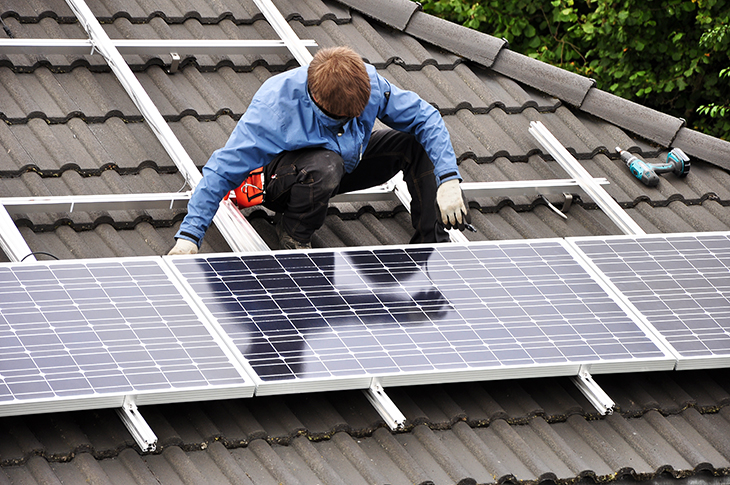
Introduction
As the world moves towards clean and sustainable energy sources, solar power has emerged as a viable alternative to traditional fossil fuels. The concept of generating electricity from the sun’s rays has been around for decades, but it’s only in recent years that solar technology has advanced to the point where it’s both efficient and affordable for homeowners.
As a result, an increasing number of people are considering installing solar panels on their property. While some opt for professional installation, others choose to take the DIY route. In this blog post, we’ll explore the benefits and drawbacks of installing your own solar panels to help you make an informed decision.
Benefits of DIY Solar Panel Installation
Cost Savings
One of the main reasons people choose to install solar panels themselves is the potential for significant cost savings. Professional installation can be expensive, sometimes costing thousands of dollars, depending on the size of the system. By installing the panels yourself, you can save on labor costs, which can make the overall project more affordable. This could mean a quicker return on your investment and long-term financial savings on your energy bills.
Customization and Flexibility
When you install your own solar panels, you have the freedom to design a system that best suits your needs and preferences. You can choose the types of panels, inverters, and batteries you want, as well as the optimal placement for maximum efficiency. This allows you to create a system that fits your specific energy needs and property layout, rather than being limited by the offerings of a professional installer.
Sense of Accomplishment and Skill-Building
For those who enjoy DIY projects, installing solar panels can be an exciting and rewarding experience. Successfully completing a solar panel installation can give you a sense of accomplishment and pride in your work. Additionally, you’ll have the opportunity to learn new skills and gain valuable knowledge about solar energy systems, which could be useful for future projects or even a career change.
Drawbacks of DIY Solar Panel Installation
Complexity and Potential for Mistakes
Installing solar panels isn’t as simple as hammering a few nails or painting a wall. It’s a complex process that requires a thorough understanding of electrical systems, building codes, and safety precautions. Without proper training or experience, you might make mistakes during the installation process that could lead to inefficiencies or even damage to your property. In some cases, these errors could negate any cost savings you might have gained by doing the installation yourself.
Time Investment
Installing solar panels on your own can be a time-consuming process, especially if you’re learning as you go. You’ll need to spend time researching, planning, and purchasing the necessary components, as well as physically installing the system. This can be a significant commitment, particularly for those with limited free time or other pressing responsibilities.
Potential Voided Warranties
When you choose to install your own solar panels, you may inadvertently void the manufacturer’s warranty on the equipment. Many manufacturers require professional installation to maintain the warranty, and if you encounter issues with the system down the road, you might be left without support or recourse. This could lead to additional costs for repairs or replacements that might not have been necessary with a professional installation.
Safety Concerns
Working with electricity always carries a certain level of risk, and solar panel installation is no exception. If you’re not familiar with the proper safety precautions, you could put yourself in danger during the installation process. Additionally, poorly installed solar panels could pose a risk to your home and its occupants if they’re not properly grounded or secured.
Permitting and Inspection Requirements
In many areas, solar panel installations require permits and inspections to ensure compliance with local building codes and regulations. Navigating this process can be confusing and time-consuming for those who are not familiar with it. Professional installers typically handle permitting and inspection requirements on your behalf, which can save you the hassle of dealing with local authorities. As a DIY installer, you’ll need to educate yourself on the specific requirements for your area and ensure that your installation meets all necessary standards.
Decreased Property Value
While a professionally installed solar energy system can increase your property’s value, a DIY installation might have the opposite effect. Potential buyers may be wary of a system that was not installed by a certified professional, as they might question its safety and effectiveness. In some cases, you may even need to remove or replace the system before selling your property, which could negate any cost savings you achieved by installing the panels yourself.
Conclusion
Deciding whether to install solar panels yourself or hire a professional installer is a personal choice that depends on your priorities, skills, and resources. DIY installation can offer cost savings, customization, and a sense of accomplishment, but it also comes with potential drawbacks, including complexity, time investment, safety concerns, and potential permitting issues.
If you’re confident in your ability to tackle a complex DIY project and are willing to invest the time and effort, installing your own solar panels could be a rewarding experience. However, if you’re unsure about your skills or simply want the peace of mind that comes with a professional installation, it might be best to leave the job to the experts.
Regardless of which route you choose, installing solar panels on your property can be a great way to reduce your carbon footprint, save on energy costs, and contribute to a cleaner, more sustainable future.
